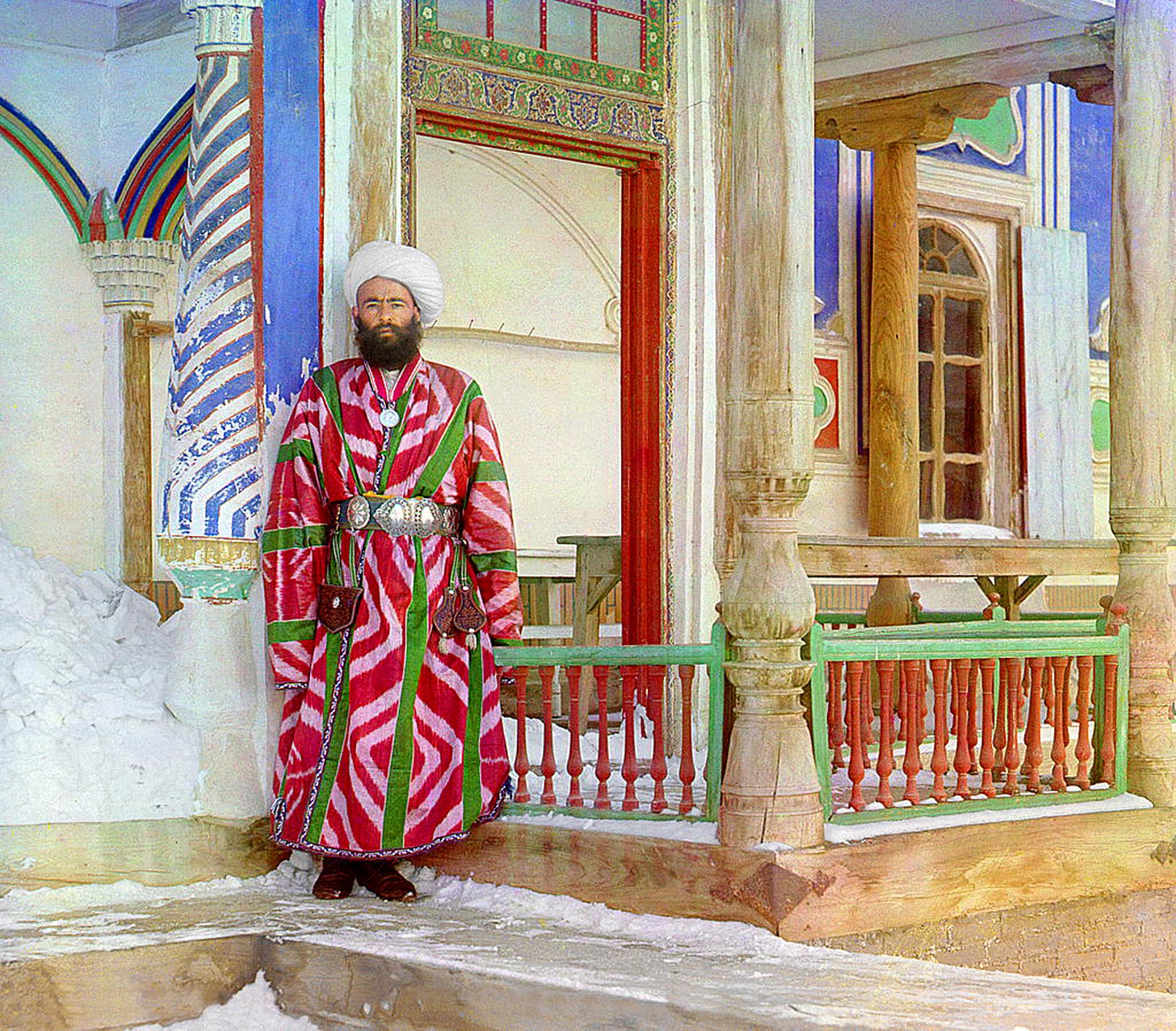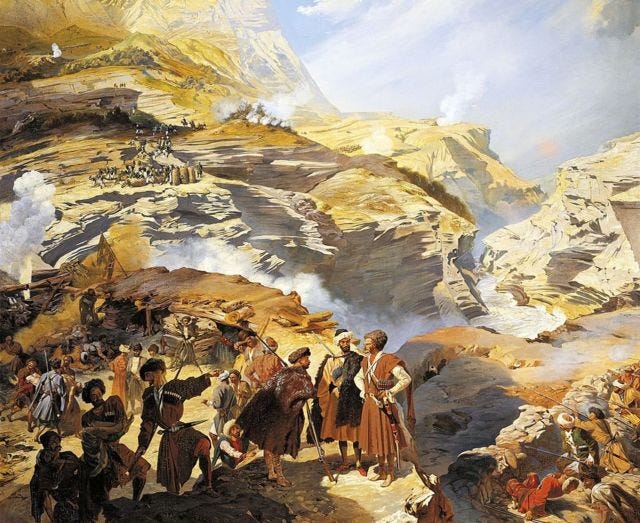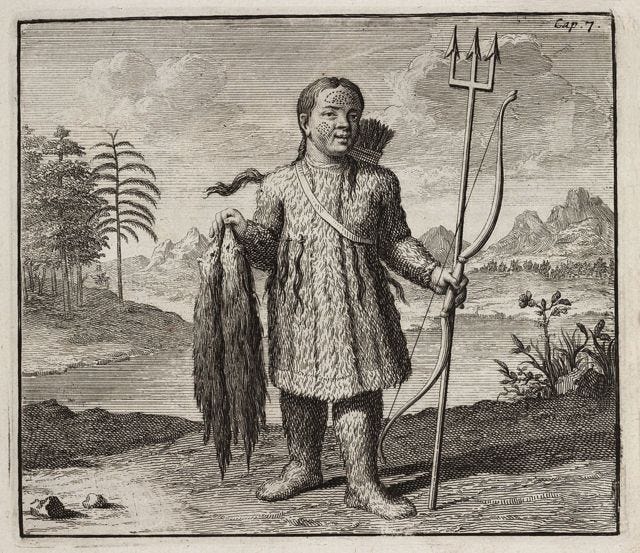Russia says it has never stained itself with colonialism. Is that true?
Russian Foreign Minister Sergei Lavrov claims that Russia 'hasn't stained itself with colonialism'. Russian history doesn't support this view.
By Grigor Atanesian

Since the beginning of the invasion of Ukraine, Russian authorities have sought different ways to explain their actions, some of which are self-contradictory. Vladimir Putin has drawn upon Peter the Great, the founder of the Russian Empire, to justify himself, at the same time as denouncing the colonialism of the West. The Russian foreign ministry also uses anti-colonial rhetoric, yet denies the country’s colonial past.
It's odd that Moscow would even touch on the question, given that it is busy ‘making Russian’ the territories it has occupied in Ukraine, seizing grain and sunflower seed from them, and expropriating their art collections.
But if the history of the present war has yet to be written, there is consensus about the past: in its annexation of new territories, Russia destroyed or russified entire peoples, and exploited their natural resources.
‘A country that colonises itself’
“Our country, which has not stained itself with the bloody crimes of colonialism, has always sincerely supported the Africans in their struggle for liberation from colonial oppression,” wrote Russia’s foreign minister Sergei Lavrov in an op-ed column printed in the newspapers of Egypt, Congo, Uganda and Ethiopia, prior to his recent tour of the countries.
His words were more than an attempt to touch a nerve in his audience. Such rhetoric has been a regular feature of Lavrov’s statements, regardless of Africa. In May, for example, he stated that while the West had conquered its colonies, the Russian Empire “never imposed its aesthetic or moral demands on other peoples as it increased its influence”.
“They all retained their own language, faith and traditions,” Lavrov said.
Historians think otherwise.
“Throughout its history, Russia has colonised the territories surrounding it,” according to Alexander Etkind, a professor at the European University in Florence.
That’s not to say that Russia’s route to empire was the same as that of the British, French or Portuguese. In contrast with them, the Russian Empire acquired next-door regions, rather than overseas lands.
“All former colonial powers have collapsed, and the former hub capitals are working through their colonial past and apologising for it. Russia meanwhile, far from apologising, is carrying on with the same colonial and imperial practices,” said Georgiy Kasianov, head of the Memory Research Laboratory at the Maria Curie-Skłodowska University in Poland.
Academics in Russia were talking about colonialism even before the 1917 Russian revolution.
“The history of Russia is the history of a country that is colonising itself. The area of colonisation increased in parallel with the realm it controlled,” wrote Vasily Klyuchevsky, a classic figure among Russian historians.
In his book, Alexander Etkind quotes Afanasy Shapov of Kazan University, who defines the conquest by Russians of Siberia as the pursuit of furs – a key Russian export, comparable to oil in modern times.
Among other examples of colonialism offered by historians is the Caucasian War of 1817-1864, the longest fought by Russia. The goal was to subdue the North Caucasus, then populated by independent mountain peoples.
Policy in the region is made clear by the words of the tsar’s viceroy, General Yermolov, who promised to lock the Chechens “in their remote and hungry slums”. Famine was one among the means of ‘reconciling’ those who resisted.
Scholars note that the Russian fortress ‘Groznaya’ – now better known as the Chechen capital Grozny – had a deliberately colonial purpose. From there, Yermolov conducted punishment raids ‘to pacify the highlanders’, and those who came after him followed the same approach. As a result of Russia’s conquest of the Caucasus, mountain peoples were wiped out or forced from their homes in what is referred to as the ‘muhajirs’ – the exile of hundreds of thousands of Circassians from their lands.
“The Circassians hate us. We drove them from their pastures. Their villages are ruined, whole tribes annihilated,” wrote Alexander Pushkin, Russia’s national poet, in his 1829 work ‘Journey to Erzurum’. The best solution, he believed, was their conversion to Orthodox Christianity – but he knew that was a hopeless idea.

For some historians, the result of the Caucasian War was the genocide of the Circassian people. The authorities of three Russian regions – Kabardino-Balkaria, Adygea and Karachay-Cherkessia – have petitioned Moscow several times to recognise the genocide. But to date, only Georgia has done so.
Russian and Ukrainian peasants were settled in place of peoples driven from Siberia, Kazakhstan and other colonised territories.
The process was managed by the Main Resettlement Directorate set up under the interior ministry at the end of the 19th century. It even published a journal: ‘Questions of Colonisation’. Resettlement was one of the chief approaches to solving the land question during the latter period of the empire.
Just as in the Caucasus, there’s no doubt among historians about the colonial nature of rule in Kazakhstan and Central Asia. Russia had begun to annex Kazakh lands even before the empire was formally declared, with the process of conquest ending only in 1890s.
Competing for influence with the British empire, and starting in the middle of the 19th century, Russia captured all of Western Turkestan, as it was then known, up to the borders of Afghanistan, India and China. It subjugated the local khanates, and at times slaughtered thousands of members of the local peoples.
One of the culminating episodes in the subjugation of the region was the storm of the fortress of Geok Tepe, by General Skobelev. Several thousand Turkmen were killed there, according to several accounts.
In the imperial capital St Petersburg, the campaign was heralded as a triumph. But not by everyone. The poet Semyon Nadson, a future idol for liberal youth, and then a military school cadet, dedicated a poem to Skobelev, in which he accused him of the brutal destruction of a peaceful country: “Your way is the way of shame!”
Soviet historians cited one of Sobolev’s letters in which he recalled that ‘Peace in Asia is directly related to the crowds of people put to the sword there”.
“We killed two thousand Turkmen at Geok Tepe,” he wrote. “Those who survived won’t forget the lesson. We sliced up with our sabres everything we came across.”
In 1916, during the First World War, there was a large-scale uprising in Central Asia against Russian colonists and the tsarist administration. It was provoked by a decree ‘requisitioning foreigners’ for work in the rear-guard. It was ruthlessly suppressed, and led to the mass flight of Kyrgyz and Kazakhs to China.
Colonial policy conducted by the empire in this region was accompanied by the “tough double oppression of the common people”, according to a textbook from the St Peterburg Institute of History. At the same time, the authors say that Russian power brought the benefits of civilisation.
It’s a classic imperial argument – the spread of culture and introduction of civilisation’s bounty is how France, Britain and other European powers justified their conquests.
Was Ukraine a colony?
The war in Ukraine has intensified arguments about its history. Ukrainian thinkers as far back as the start of the 20th century described their country as a Russian colony.
But the government in St Petersburg didn’t term the country a colony in the open way it referred to the Caucasus and Central Asia. The imperial authorities preferred the idea of a greater Russian nation, including Ukrainians and Belarusians. They pursued a policy of russification that included banning the publication of books in Ukrainian and a quest for linguistic assimilation.
Georgiy Kasianov suggests that russification may not be the right term, since the authorities considered these territories Russian in the first place. As far as they were concerned, they were fighting back against ukrainianisation, and the spread of Ukrainian as a written culture.
It wasn’t just the Ukrainian intelligentsia who resisted this, but also a number of liberals, socialists and other opponents of imperial power in Russia itself.
The tensions only grew stronger with the collapse of the empire. An independent Ukrainian state was briefly founded, but Bolsheviks seized power in Kyiv in 1919 and again made the country subject to Russia.
In the early Soviet period, a policy of ‘indigenisation’ was promulgated, encouraging the development of national languages and cultures. But under Stalin, russification returned, along with elements of imperial ideology.
The greatest tragedy was the Holodomor of 1932-33, the famine in Ukraine that took the lives of approximately 3.9 million people. In Ukraine, it is officially recognised as genocide, and the majority of Ukrainian historians agree with the designation.
So did Raphael Lemkin, the lawyer who first coined the term ‘genocide’. He pointed out that along with the famine, the Ukrainian elites and Ukrainian church were destroyed, and Russian peasants were settled in the emptied villages.
Russian historians tend to dispute this characterisation. They accept that the tragedy was organised, but consider it instead a consequence of Stalin’s collectivisation, which led to famines elsewhere, including in Kazakhstan and the Volga region.
Studying the relationship between soviet Ukraine and Moscow, the historian Ivan Lysak-Rudnitsky in 1972 predicted the collapse of the USSR. He considered the Soviet Union to be at heart a colonial empire, even though it promoted an anti-colonial ideology.
“A government which is entangled in insoluble contradictions with the principles from which it derives its legitimacy cannot endure for very long”, he wrote.
Etkind believes that even today Russia is conducting a colonial war in Ukraine – though of a very specific kind. Russia’s motivation, in his opinion, is not the capture of resources, but revanchism.
“They’re fighting for this land not for gold or coal, but simply because it used to belong to them.”
Read this story in Russian here.
Translated by Chris Booth.





